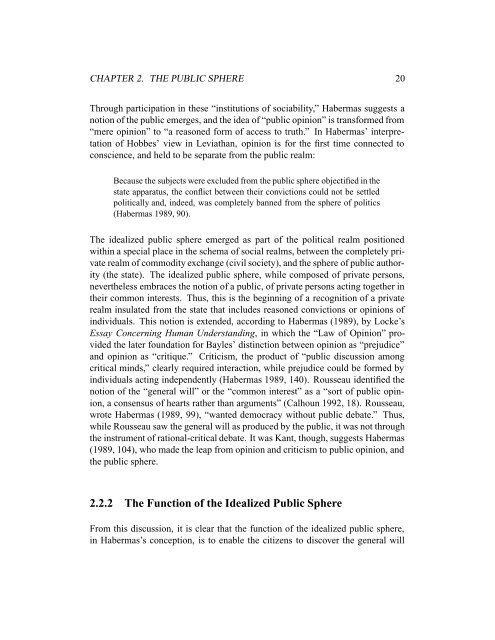Expanding the Public Sphere through Computer ... - ResearchGate
Expanding the Public Sphere through Computer ... - ResearchGate
Expanding the Public Sphere through Computer ... - ResearchGate
You also want an ePaper? Increase the reach of your titles
YUMPU automatically turns print PDFs into web optimized ePapers that Google loves.
CHAPTER 2. THE PUBLIC SPHERE 20<br />
Through participation in <strong>the</strong>se “institutions of sociability,” Habermas suggests a<br />
notion of <strong>the</strong> public emerges, and <strong>the</strong> idea of “public opinion” is transformed from<br />
“mere opinion” to “a reasoned form of access to truth.” In Habermas’ interpretation<br />
of Hobbes’ view in Leviathan, opinion is for <strong>the</strong> first time connected to<br />
conscience, and held to be separate from <strong>the</strong> public realm:<br />
Because <strong>the</strong> subjects were excluded from <strong>the</strong> public sphere objectified in <strong>the</strong><br />
state apparatus, <strong>the</strong> conflict between <strong>the</strong>ir convictions could not be settled<br />
politically and, indeed, was completely banned from <strong>the</strong> sphere of politics<br />
(Habermas 1989, 90).<br />
The idealized public sphere emerged as part of <strong>the</strong> political realm positioned<br />
within a special place in <strong>the</strong> schema of social realms, between <strong>the</strong> completely private<br />
realm of commodity exchange (civil society), and <strong>the</strong> sphere of public authority<br />
(<strong>the</strong> state). The idealized public sphere, while composed of private persons,<br />
never<strong>the</strong>less embraces <strong>the</strong> notion of a public, of private persons acting toge<strong>the</strong>r in<br />
<strong>the</strong>ir common interests. Thus, this is <strong>the</strong> beginning of a recognition of a private<br />
realm insulated from <strong>the</strong> state that includes reasoned convictions or opinions of<br />
individuals. This notion is extended, according to Habermas (1989), by Locke’s<br />
Essay Concerning Human Understanding, in which <strong>the</strong> “Law of Opinion” provided<br />
<strong>the</strong> later foundation for Bayles’ distinction between opinion as “prejudice”<br />
and opinion as “critique.” Criticism, <strong>the</strong> product of “public discussion among<br />
critical minds,” clearly required interaction, while prejudice could be formed by<br />
individuals acting independently (Habermas 1989, 140). Rousseau identified <strong>the</strong><br />
notion of <strong>the</strong> “general will” or <strong>the</strong> “common interest” as a “sort of public opinion,<br />
a consensus of hearts ra<strong>the</strong>r than arguments” (Calhoun 1992, 18). Rousseau,<br />
wrote Habermas (1989, 99), “wanted democracy without public debate.” Thus,<br />
while Rousseau saw <strong>the</strong> general will as produced by <strong>the</strong> public, it was not <strong>through</strong><br />
<strong>the</strong> instrument of rational-critical debate. It was Kant, though, suggests Habermas<br />
(1989, 104), who made <strong>the</strong> leap from opinion and criticism to public opinion, and<br />
<strong>the</strong> public sphere.<br />
2.2.2 The Function of <strong>the</strong> Idealized <strong>Public</strong> <strong>Sphere</strong><br />
From this discussion, it is clear that <strong>the</strong> function of <strong>the</strong> idealized public sphere,<br />
in Habermas’s conception, is to enable <strong>the</strong> citizens to discover <strong>the</strong> general will
















